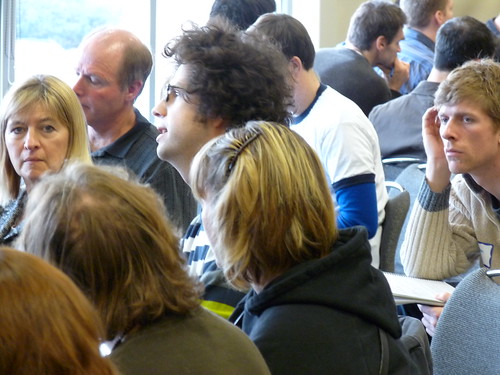On Saturday October 17, over 180 engaged citizens converged to participate in the first ChangeCamp Edmonton. Here are five items that I found to be the most interesting parts of the day-long event:
5) Diversity: Participants came from many diverse backgrounds and I was pleasantly surprised that there were many people who I didn’t recognize from other political events. The large majority of participants were non-partisan (which was extremely refreshing) and sincerely interested in changing the way citizens interact with their governments (and vice versa). I would like to see future ChangeCamps reach out more actively to new Canadians and underrepresented communities in our city who face very unique challenges to participating in governance. Increased outreach will be important for any sequels to this event, but overall I was very impressed with the range of citizens who gave up their Saturday to participate in re-imaging citizenship.
4) A little help from our friends: Videos from ChangeCamp Ottawa and ChangeCamp Toronto welcomed participants to a growing pan-Canadian ChangeCamp community.
3) Equal participation: The politicians weren’t introduced. I give full credit to the elected officials who attended ChangeCamp Edmonton, but unlike many other events, they weren’t confered a special status through introduction at the beginning of the day. They were equal participants, and I believe set a positive tone for the day. Many elected officials may have had legitimate reasons not be in attendance, but I will full give credit to those who did participate: Public School Trustee Sue Huff, Councillors Don Iveson and Ben Henderson, MLAs Laurie Blakeman and Doug Elniski, former MLAs David King and Don Massey, and past and present candidates for office Brendan Van Alstine, Andrew Knack, Wendy Andrews, and Mary MacDonald.
2) Opinions are easy, ideas are hard: There were some great discussions ranging from open data, the evolution of media and technology, but it felt like much of the debate around revitalizing citizen engagement and the de-polarizing of community discussions was re-hashed from previous discussions. I had the distinct impression that almost all of the participants who were engaged citizens, were simply bringing up ideas that they had heard elsewhere. On this topic, I believe that is past the point of talking. Get your friends and neighbours engaged. It starts on the community level.
1) It was organic: The organic elements are what I found to be the most powerful part of this un-conference. The steering committee that met at the beginning of 2009 was largely connected through Twitter, which helped coalesce a group of people who might not normally find themselves working together to organize a project like this. Word of ChangeCamp was largely spread through the internet (twitter, facebook, blogs, etc). The underlying concept of an unconference – an organic “facilitated, participant-driven conference” – was demonstrated at the opening of ChangeCamp, when anyone had the opportuntity to pitch an idea and add a session idea to the grid.
Related and Recommended:
Alex Abboud: ChangeCamp Edmonton: Evolution, not revolution.
Chris Labossiere: A great day for the Future Democracy
Sirthinks: The empires of the future are the empires of the mind




